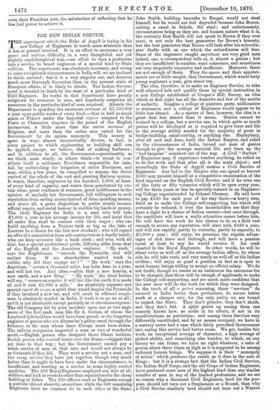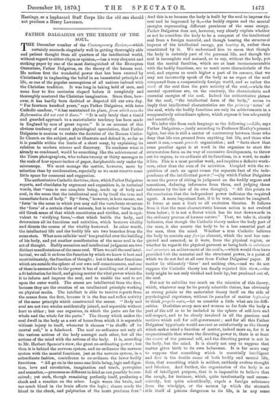THE NEW INDIAN SERVICE. T HE experiment which the Duke of
Argyll is trying in his new College of Engineers is worth more attention than it has at present received. It is an effort to overcome a very grave and serious difficulty, in a very thoughtful, and yet slightly unphilosophical way,—an effort to turn a profession into a service, to breed engineers of a special kind by State volition. The experiment was absolutely necessary, and owing to some exceptional circumstances in India will, we are inclined to think, succeed ; but it is a very singular one, and deserves much more thorough discussion than, in the present state of European affairs, it is likely to obtain. The Indian Govern- ment is worried to death by the want of a particular kind of Civil Engineer. Its works in that department have greatly outgrown its resources in men, and hopelessly outgrown its resources in the particular kind of men required. Already the Department is spending the enormous revenue of £7,500,000 a year upon public works of every kind,—that is, half as much again as France under the Imperial regime assigned to the Ponts et Chaussees, sixpence in the pound of the English income-tax, a little more than the entire revenue of Belgium, and more than the entire sum raised for the Government by its opium monopoly. This money is spent in ways almost inconceivably diverse, in fact, in every project to which engineering or building skill can be applied, except, wo believe, that of making harbours ; and in addition to all, the Government—questionably, as we think, most wisely, as others think—is about to con- stitute itself a sublunary Providence responsible for rain- fall, by undertaking the irrigation of entire Provinces, and may, within a few years, be compelled to assume the direct control of the whole of the vast and growing Railway system. It wants, therefore, engineers by the hundred, 1,000, at least, of every kind of capacity, and wants them penetrated by cer- tain ideas, great readiness of resource, great indifference to the opinion of anybody but Government, full willingness to seek reputation from saving money instead of from spending money, and above all, a great disposition to prefer steady income, official repute, and social honour to sudden big hauls of money. The ideal Engineer for India is a man who will take £1,000 a year as his average income for life, and insist that all under him shall be content with their wages ; who can build anything, from a Tanjore tank as big as the lake of Lucerne to a cloaca for the last new stockade ; who will regard an offer of a commission from sub-contractors as a deadly insult; who can keep accounts like a bank clerk ; and who, with all that, has a special professional pride, differing alike from that of the English and the American engineer. " My work," says the Englishman, " exceeds the Pyramids, and will outlast them. If my shareholders wanted work in rabble, why did they engage me ? " " My work," says the American, " covers a thousand miles, has been done in a year, and will last ten. And after,—after that a new heaven, a new earth, and a new Ring." " My work," the ideal Indian will say, " crosses an empire, it will last like the earth it is made of, and it cost £1,000 a mile." An absolutely separate and special esprit de amps, a spirit that would despise the Pyramids if they involved a new tax, and will exult in efficient rough- ness, is absolutely needed in India, if work is to go on at all ; and it is not attainable except partially or at enormous expense. The old Company hit by pure accident upon one or two engi- neers of the first rank, men like Sir A. Cotton, of whom the Lombard dykebuilders would have been proud, or the forgotten engineer of genius who cut Alexander's galley canal through the Isthmus, or the man whose fame Cheops must have stolen. The railway companies imported a man or two of wonderful merit,—English person who designed those Ghaut inclines, Scotch person who carried trains over the Soane,—biggest feat yet done in that way ; but the Government cannot pay a whole service of men at that rate, and would not always be as fortunate if they did. They want a service, not a man, and the scrap service they have got together, though very much better than it ought to have been under the circumstances, is insufficient, and wanting as a service in some highly needed qualities. The 250 Royal Engineers employed are, first of all, soldiers, and look to rewards other than reputations for the cheap building of dykes. The 150 officers used as Engineers occupy a position almost absurdly anomalous, while the 500 remaining Engineers have no common tie to each other or the State. John Smith, building barracks in Bengal, would not steal himself, but he would not feel degraded because John Brown, cutting a canal in Scinde, did steal ; and unfortunately, circumstances being as they are, and human nature what it is, the certainty that Smith will not speak to Brown if they ever meet, is not only the best guarantee for Brown's honesty, but the best guarantee that Brown will look after his subordin- ates' thefts with an eye which the subordinates will fear. Some of the engineers caught anywhere are very pod men indeed, one, a correspondent tells us, is almost a genius ; but they are insufficient in number, want coherence, and sometimes are very singularly expensive and inefficient. Moreover, there are not enough of them. They die apace, and their appoint- ments are so little sought, that Government, which wants forty young engineers a year, gets about ten.
The idea, therefore, is to make an Engineer Service, to take well educated lads and qualify them by special instruction in a new College established at Cooper's Hill, Surrey, an idea which at first sight has all the demerits and few of the merits of audacity. Imagine a college of painters, poets, millionaires or statesmen, and a college of Engineers would appear to be little less absurd. As a matter of fact, however, the idea is a great deal less absurd than it seems. Genius cannot be trained in a college, but a service can, in which quite as much genius will be developed as is required to give force and life to the average ability needed for the majority of posts in bridge-building, canal-cutting, or anything else. Hayleybury, after all said and done, built the Indian Empire, and aided by the circumstances of India, turned out men of genius enough to give the average material life, and burn up the " bad bargains " somehow out of the way. A Civil " Service " of Engineers may, if experience teaches anything, be relied on to do the work, and that, after all, is the main object ; and accordingly the Duke of Argyll creates a Civil Service of Engineers. Any lad in the Empire who can spend or borrow £500 may present himself at a competitive examination of the kind imposed on the English Civil Service, and if he wins one of the forty or fifty vacancies which will be open every year, will for three years or less be specially trained in an Engineer- ing College superintended by Colonel Chesney. He will have to pay £150 for each year of his stay there—a heavy sum, fixed on to make the College self-supporting, but which will certainly be reduced, if ever the householders see that they have a right to a chance of Indian careers—but once through, the candidate will have a really attractive career before him, He will have the work he has chosen to do on a field vast enough to secure any reputation, will start with £420 a year, and will rise rapidly, partly by seniority, partly by capacity, to £3,000 a year ; will enjoy, we presume, the regular advan- tages of sick leave and furlough, and will have a pension equal at least to any he would receive if his rank counted in the Royal Engineers. In other words, he will be about twice as well off as the average Indian officer, by whose side he will take rank, and very nearly as well off as the Indian civilian ; will enjoy as good a position in fact as is open to most human beings willing to accept an official salary. We do not doubt, though we resent as an unfairness the enormous fee to be charged, that there will be enough of applicants to make the College self-supporting, and are much more confident that the new men• will do the work for which they were designed. In the teeth of all a priori reasoning, these " services " do succeed in India better than professions, do secure better work at a cheaper rate, for the only entity we are bound to regard, the State. They don't plunder, they don't skulk, and they don't fail. A spirit grows up among them one scarcely knows how, as noble in its effects, if not in its manifestations, as patriotism; and among three Services very differently constituted, and by no means overpaid, we have in a century never had a case which fairly provoked Government into saying this service had better cease. We get, besides fair work, an exceptional average of character, a high average of picked ability, and something else besides, to which, on any theory we can frame, we have no right whatever, a ratio of genius about three times as high as it is supposed to be among ordinary human beings. We suppose it is their "monopoly of action" which produces the result, as it does in the case of Kings ; but it is a strange fact that the Indian Civil Service, the Indian Staff Corps, and the old Corps of Indian Engineers, have produced more men of the highest kind than any similar number of men in any of the limited professions, and we see no reason why a thousand Civil Engineers, bred for the pur- pose, should not turn out a Stephenson or a Brunel, than why a Civil Service similarly bred should not turn out a Warren Hastings, or a haphazard Staff Corps like the old one should not produce a Henry Lawrence.



































 Previous page
Previous page